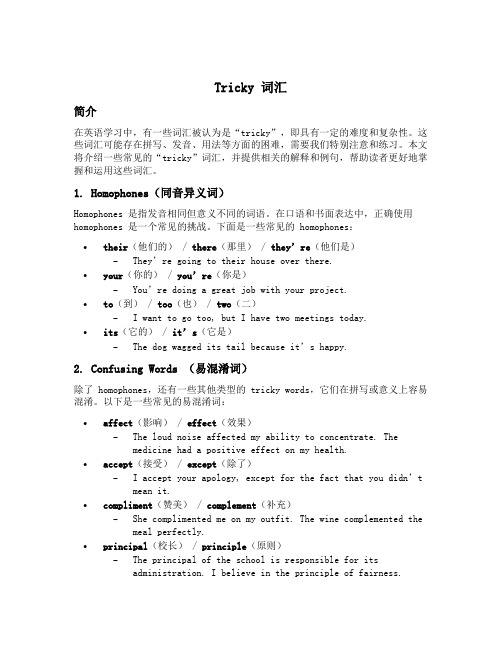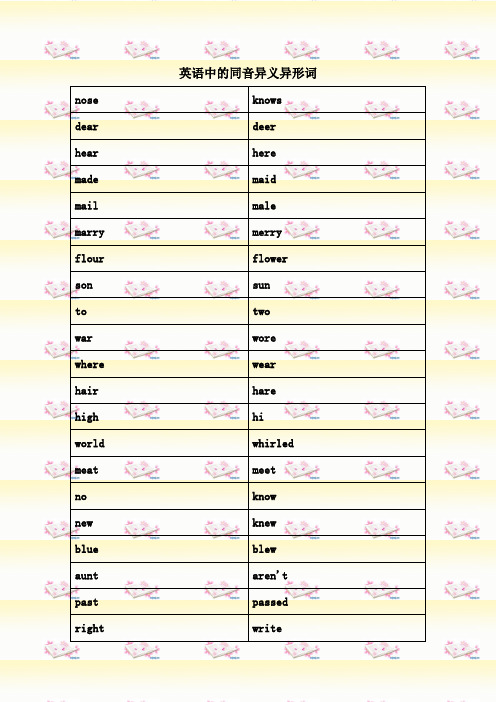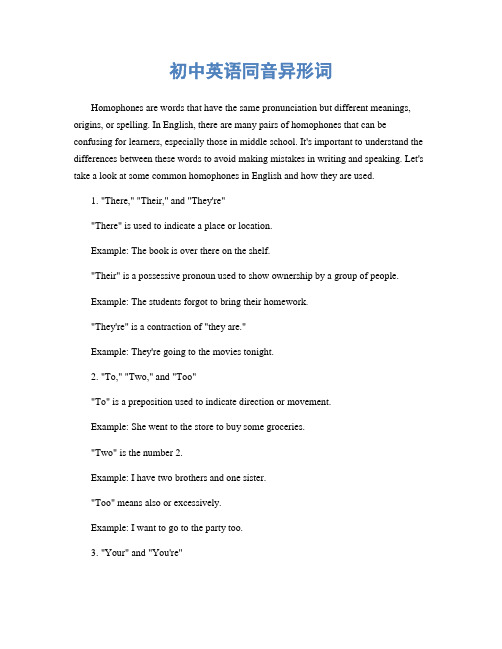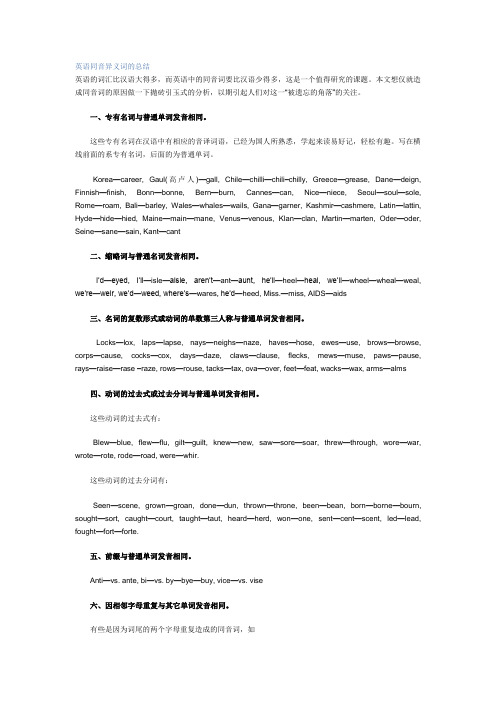英语同音异形词练习homophones-matching-game
tricky 词汇

Tricky 词汇简介在英语学习中,有一些词汇被认为是“tricky”,即具有一定的难度和复杂性。
这些词汇可能存在拼写、发音、用法等方面的困难,需要我们特别注意和练习。
本文将介绍一些常见的“tricky”词汇,并提供相关的解释和例句,帮助读者更好地掌握和运用这些词汇。
1. Homophones(同音异义词)Homophones 是指发音相同但意义不同的词语。
在口语和书面表达中,正确使用homophones 是一个常见的挑战。
下面是一些常见的 homophones:•their(他们的) / there(那里) / they’re(他们是)–They’re going to their house over there.•your(你的) / you’re(你是)–You’re doing a great job with your project.•to(到) / too(也) / two(二)–I want to go too, but I have two meetings today.•its(它的) / it’s(它是)–The dog wagged its tail because it’s happy.2. Confusing Words (易混淆词)除了 homophones,还有一些其他类型的 tricky words,它们在拼写或意义上容易混淆。
以下是一些常见的易混淆词:•affect(影响) / effect(效果)–The loud noise affected my ability to concentrate. The medicine had a positive effect on my health.•accept(接受) / except(除了)–I acc ept your apology, except for the fact that you didn’t mean it.•compliment(赞美) / complement(补充)–She complimented me on my outfit. The wine complemented the meal perfectly.•principal(校长) / principle(原则)–The principal of the school is responsible for itsadministration. I believe in the principle of fairness.3. Phrasal Verbs (短语动词)Phrasal verbs 是由动词与介词或副词组合而成的短语,其意义往往与原始动词不同。
英语词汇学—同音异义异形词

英语中的同音异义异形词nose knowsdear deerhear heremade maidmail male marry merryflour flowerson sunto twowar wore where wearhair harehigh hiworld whirled meat meetno knownew knewblue blewaunt aren't past passed right writewhole holethrew throughbuy byerode roadfour forfarther fathertheir therewhether weatherguest guessed可能有重复,格式……不管了,顾不过来了add-adaids-aidesallowed-aloudalter-alterark-arcbail-baleband-bannedbase-bassbeach-beechbite-byteblock-blocblue-blewbored-boardbread-bredbrews-bruisebrowse-browsbury-berrycannon-canoncereal-serialchili-chillychoose-chewsclause-clawcolonel-kernel complimentary-complementarycore-corpscourse-coarsecreak-creekcruise-crewsdessert-desertdie-dyefate-fetefind-finedflee-fleafur-firguerrilla-gorillaheal-heelheroin-heroinehim-hymnhorse-hoarseI’ll-isle-aisleidle-idolknows-nosesled-lead lightning-lighteningmade-maidmarshal-martialmat-mattmayor-maremedal-meddlemissed-mistnot-knotone-wonours-hours overseas-overseespair-pear-pare palate-palette-pallet paste-pacedpours-porespeak-peek-piquepeer-pierpigeon-pidginplum-plumbpole-pollqueue-cuerain-reign-reinraise-raze-rayssensor-censorsent-cent-scentshoot-chutesoar-soresoul-sole-Seoulstair-starestake-steak stationary-stationery straight-straitswat-swotsweet-suitetale-tailtaught-tautteam-teemtear-tierthrough-thronetick-tictire-tidetime-thymetoe-towvain-veinwait-weightwarn-wornwaste-waistwave-waiveway-weighweek-weakwe’ll-wheelwe’ve-weavewhale-wailwhales-Waleswhat-wattwhere-wear-warewhether-weather which-witchwhole-holewine-whine。
英语词汇学—同音异义异形词

英语中的同音异义异形词nose knowsdear deerhear heremade maidmail male marry merryflour flowerson sunto twowar wore where wearhair harehigh hiworld whirled meat meetno knownew knewblue blewaunt aren't past passed right writewhole holethrew throughbuy byerode roadfour forfarther fathertheir therewhether weatherguest guessed可能有重复,格式……不管了,顾不过来了add-adaids-aidesallowed-aloudalter-alterark-arcbail-baleband-bannedbase-bassbeach-beechbite-byteblock-blocblue-blewbored-boardbread-bredbrews-bruisebrowse-browsbury-berrycannon-canoncereal-serialchili-chillychoose-chewsclause-clawcolonel-kernel complimentary-complementarycore-corpscourse-coarsecreak-creekcruise-crewsdessert-desertdie-dyefate-fetefind-finedflee-fleafur-firguerrilla-gorillaheal-heelheroin-heroinehim-hymnhorse-hoarseI’ll-isle-aisleidle-idolknows-nosesled-lead lightning-lighteningmade-maidmarshal-martialmat-mattmayor-maremedal-meddlemissed-mistnot-knotone-wonours-hours overseas-overseespair-pear-pare palate-palette-pallet paste-pacedpours-porespeak-peek-piquepeer-pierpigeon-pidginplum-plumbpole-pollqueue-cuerain-reign-reinraise-raze-rayssensor-censorsent-cent-scentshoot-chutesoar-soresoul-sole-Seoulstair-starestake-steak stationary-stationery straight-straitswat-swotsweet-suitetale-tailtaught-tautteam-teemtear-tierthrough-thronetick-tictire-tidetime-thymetoe-towvain-veinwait-weightwarn-wornwaste-waistwave-waiveway-weighweek-weakwe’ll-wheelwe’ve-weavewhale-wailwhales-Waleswhat-wattwhere-wear-warewhether-weather which-witchwhole-holewine-whine。
初中英语同音异形词

初中英语同音异形词Homophones are words that have the same pronunciation but different meanings, origins, or spelling. In English, there are many pairs of homophones that can be confusing for learners, especially those in middle school. It's important to understand the differences between these words to avoid making mistakes in writing and speaking. Let's take a look at some common homophones in English and how they are used.1. "There," "Their," and "They're""There" is used to indicate a place or location.Example: The book is over there on the shelf."Their" is a possessive pronoun used to show ownership by a group of people.Example: The students forgot to bring their homework."They're" is a contraction of "they are."Example: They're going to the movies tonight.2. "To," "Two," and "Too""To" is a preposition used to indicate direction or movement.Example: She went to the store to buy some groceries."Two" is the number 2.Example: I have two brothers and one sister."Too" means also or excessively.Example: I want to go to the party too.3. "Your" and "You're""Your" is a possessive pronoun used to show ownership by the person you are talking to.Example: Is this your book?"You're" is a contraction of "you are."Example: You're going to love this movie.4. "Here" and "Hear""Here" is used to indicate a place or location.Example: Come here and sit next to me."Hear" means to perceive sound with your ears.Example: Can you hear the music playing?5. "Waste" and "Waist""Waste" is a verb meaning to use or expend carelessly.Example: Don't waste your time on things that don't matter."Waist" is the part of the body between the ribs and hips.Example: She wore a belt around her waist.6. "Flower" and "Flour""Flower" is a plant with brightly colored petals.Example: She received a bouquet of flowers for her birthday."Flour" is a powder made by grinding grains, used for baking.Example: Mix the flour with water to make dough.7. "Break" and "Brake""Break" is a verb meaning to separate into pieces.Example: Be careful not to break the glass."Brake" is a device used to slow down or stop a vehicle.Example: Press the brake pedal to stop the car.Understanding the differences between these homophones can help improve your English writing and speaking skills. Practice using them in sentences to become more familiar with their meanings and usage. Remember to pay attention to spelling and context to choose the correct homophone in your communication.。
英语知识点总结高考单词

英语知识点总结高考单词导语:英语是高考中的一项重要科目,而词汇是英语学习的基础。
掌握一定的英语单词,能够有效地提高英语学习的效果,也是高考取得好成绩的重要保证。
本文将对高考英语中常见的一些知识点进行总结,其中包括单词的拼写、近义词、词语搭配等方面的内容。
一、拼写和用法1. Homophones 同音异义词Homophones are words that sound the same but have different meanings. For example, "plane" and "plain" sound identical, but have different definitions. It's important to know the correct spelling and usage of homophones to avoid confusion in writing.2. Irregular Verbs 不规则动词Irregular verbs don't follow the regular pattern of adding "-ed" to form the past tense. For example, "go" becomes "went" in the pasttense. Memorizing the irregular verbs and their past tense forms is essential for English learners.3. Prepositions 介词Prepositions are words that show the relationship between different elements in a sentence. They can be tricky to use correctly, especially for non-native English speakers. Understanding the correct preposition to use in different contexts is crucial for clear and accurate communication.二、近义词与词语搭配1. Synonyms 同义词Synonyms are words that have similar meanings. Knowing synonyms can help you vary your vocabulary and avoid repetition in your writing. For example, "happy" and "joyful" are synonyms that can be used interchangeably in certain contexts.2. Collocations 词语搭配Collocations refer to words that frequently appear together and sound natural to native speakers. For example, we say "make a decision" instead of "do a decision". Memorizing collocations can help you sound more fluent and native-like in your English.三、常见考点1. Idioms 成语Idioms are phrases that have a figurative meaning and cannot be understood by their literal translation. For example, "break a leg" means "good luck" in English. Learning and using idioms appropriately can enhance your language skills and help you better understand conversations and texts.2. Phrasal Verbs 短语动词Phrasal verbs consist of a verb and one or more prepositions or adverbs. They often have a different meaning from the individual words that make them up. For example, "take off" means "remove" or"depart" depending on the context. Understanding phrasal verbs is key to mastering English language usage.3. Word Formation 词汇构成Word formation refers to the process of creating new words or deriving words from existing ones. It includes suffixes, prefixes, and compound words. Understanding word formation rules can help you decipher the meanings of unfamiliar words and expand your vocabulary.四、记忆技巧1. Mnemonics 记忆法Mnemonics are memory aids or techniques that help us remember information more easily. For example, creating acronyms or linking words with visual images can assist in memorizing difficult words or concepts. Using mnemonics can make the learning process more engaging and effective.2. Contextual Learning 上下文学习Learning words in context is an efficient way to remember them. By seeing how words are used in real-life situations or reading passages, you can better understand their meanings and usage. Contextual learning also helps to develop language skills and improve overall comprehension.结束语:本文对高考英语中常见的单词知识点进行了总结,包括拼写、近义词、词语搭配等方面的内容。
英语词汇学—同音异义异形词

英语中的同音异义异形词nose knowsdear deerhear heremade maidmail male marry merryflour flowerson sunto twowar wore where wearhair harehigh hiworld whirled meat meetno knownew knewblue blewaunt aren't past passed right writewhole holethrew throughbuy byerode roadfour forfarther fathertheir therewhether weatherguest guessed可能有重复,格式……不管了,顾不过来了add-adaids-aidesallowed-aloudalter-alterark-arcbail-baleband-bannedbase-bassbeach-beechbite-byteblock-blocblue-blewbored-boardbread-bredbrews-bruisebrowse-browsbury-berrycannon-canoncereal-serialchili-chillychoose-chewsclause-clawcolonel-kernel complimentary-complementarycore-corpscourse-coarsecreak-creekcruise-crewsdessert-desertdie-dyefate-fetefind-finedflee-fleafur-firguerrilla-gorillaheal-heelheroin-heroinehim-hymnhorse-hoarseI’ll-isle-aisleidle-idolknows-nosesled-lead lightning-lighteningmade-maidmarshal-martialmat-mattmayor-maremedal-meddlemissed-mistnot-knotone-wonours-hours overseas-overseespair-pear-pare palate-palette-pallet paste-pacedpours-porespeak-peek-piquepeer-pierpigeon-pidginplum-plumbpole-pollqueue-cuerain-reign-reinraise-raze-rayssensor-censorsent-cent-scentshoot-chutesoar-soresoul-sole-Seoulstair-starestake-steak stationary-stationery straight-straitswat-swotsweet-suitetale-tailtaught-tautteam-teemtear-tierthrough-thronetick-tictire-tidetime-thymetoe-towvain-veinwait-weightwarn-wornwaste-waistwave-waiveway-weighweek-weakwe’ll-wheelwe’ve-weavewhale-wailwhales-Waleswhat-wattwhere-wear-warewhether-weather which-witchwhole-holewine-whine。
英语同音异形异义词

英语同音异义词的总结英语的词汇比汉语大得多,而英语中的同音词要比汉语少得多,这是一个值得研究的课题。
本文想仅就造成同音词的原因做一下抛砖引玉式的分析,以期引起人们对这一“被遗忘的角落”的关注。
一、专有名词与普通单词发音相同。
这些专有名词在汉语中有相应的音译词语,已经为国人所熟悉,学起来读易好记,轻松有趣。
写在横线前面的系专有名词,后面的为普通单词。
Korea—career, Gaul(高卢人)—gall, Chile—chilli—chili–chilly, Greece—grease, Dane—deign, Finnish—finish, Bonn—bonne, Bern—burn, Cannes—can, Nice—niece, Seoul—soul—sole, Rome—roam, Bali—barley, Wales—whales—wails, Gana—garner, Kashmir—cashmere, Latin—lattin, Hyde—hide—hied, Maine—main—mane, Venus—venous, Klan—clan, Martin—marten, Oder—oder, Seine—sane—sain, Kant—cant二、缩略词与普通名词发音相同。
I’d—eyed, I’ll—isle—aisle, aren’t—ant—aunt, he’ll—heel—heal, we’ll—wheel—wheal—weal, we’re—weir, we’d—weed, where’s—wares, he’d—heed, Miss.—miss, AIDS—aids三、名词的复数形式或动词的单数第三人称与普通单词发音相同。
Locks—lox, laps—lapse, nays—neighs—naze, haves—hose, ewes—use, brows—browse, corps—cause, cocks—cox, days—daze, claws—clause, flecks, mews—muse, paws—pause, rays—raise—rase –raze, rows—rouse, tacks—tax, ova—over, feet—feat, wacks—wax, arms—alms四、动词的过去式或过去分词与普通单词发音相同。
小学英语同课异构活动方案及策略

小学英语同课异构活动方案及策略全文共6篇示例,供读者参考篇1Title: Fun and Interactive Activities for English HomophonesHey guys! Today I want to talk to you about English homophones. Do you know what they are? Homophones are words that sound the same but have different meanings and spellings. For example, “two”, “to” and “too” are homophones.To help us understand homophones better, we are going to do some fun activities in class. Are you excited? Let’s get started!Activity 1: Homophone Matching GameIn this game, we will have cards with homophone pairs on them. Your task will be to match the cards with the correct homophone pairs. For example, you will have a card with “bare” and another card with “bear”. You need to match them because they sound the same but have different meanings.Activity 2: Homophone CharadesIn this activity, we will split into two teams. One team member will act out a homophone word while the rest of the team tries to guess the word. For example, if the word is “bee”, the person can pretend to fly like a bee. It will be so much fun!Activity 3: Homophone Scavenger HuntIn this scavenger hunt, you will be given a list of homophones to find around the classroom. You will need to find the objects that represent the homophones and match them. For example, you might need to find a pair of socks for “pair” and a pear fruit fo r “pear”.I hope you guys are excited about these activities. By playing these games, we will have a better understanding of English homophones and have fun at the same time. Let’s get started and have a blast learning together!篇2Hello everyone! Today I'm going to talk about the plan and strategies for English homophones in elementary school.First of all, what are homophones? Homophones are words that sound the same but have different meanings and spellings.For example, "hear" and "here" are homophones because they sound the same but are spelled differently.To help students understand and remember homophones, we can use fun and interactive activities in the classroom. Here are some ideas:1. Homophone Matching Game: Create cards with homophones written on them and have students match the correct pairs. This can be done as a group activity or as a game where students compete against each other.2. Homophone Bingo: Create bingo cards with homophones written in the squares. Call out definitions or sentences that include the homophones and have students mark the correct word on their cards.3. Homophone Charades: Write homophones on cards and have students act out the meanings of the words without speaking. This can be a fun way to reinforce the meanings of homophones.4. Homophone Pictionary: Have students draw pictures of homophones and have their classmates guess the word. This can be a creative way to practice identifying homophones.In addition to these activities, it's important to reinforce the concepts regularly in class. Encourage students to use homophones in sentences, stories, and conversations. You can also incorporate homophones into spelling tests and writing assignments to ensure that students are practicing and using the words correctly.Overall, making learning fun and engaging is key to helping students understand and remember homophones. By incorporating games, activities, and regular practice, students will be able to confidently use homophones in their everyday language. Remember, practice makes perfect!篇3Title: Fun and Interactive Activities for English Same Class Different Structure in Elementary SchoolHey everyone! Today, I'm going to share with you some super cool ideas for the English "same class different structure" activities in elementary school. These activities will help you improve your English skills in a fun and engaging way. Let's get started!Activity 1: Word ScrambleIn this activity, the teacher will write a jumbled word on the board and students have to unscramble it to form the correct word. For example, the word "cat" can be jumbled as "tac". This activity will help you improve your spelling and vocabulary.Activity 2: Sentence BuildingIn this activity, the teacher will provide a set of words and students have to arrange them to form a meaningful sentence. This will help you understand sentence structure and grammar rules better.Activity 3: Role-PlayRole-playing is a fun way to practice speaking and listening skills. The teacher can assign different roles to students and they have to act out a conversation using the same class different structure. For example, using "I am" and "He is" in a conversation.Activity 4: Picture DictationIn this activity, the teacher will describe a picture and students have to draw it based on the description. This will help improve your listening skills and vocabulary.Activity 5: Word AssociationThe teacher will write a word on the board and students have to come up with words that are related to it. This will help you expand your vocabulary and make connections between words.These activities are not only fun but also educational. So, next time you have an English class, be sure to try out these activities to improve your English skills. Have fun learning!篇4Title: Fun Activities to Learn Same Sounds Different Writing in EnglishHey everyone! Today I'm going to share with you some super fun activities to help us learn about same sounds but different writing in English. You know, like "cat" and "car" sound the same but are written differently. Let's get started!Activity 1: Matching GameFor this game, we will need cards with words that have the same sound but different spelling. For example, we can have "blue" and "blew", "see" and "sea", "night" and "knight". Mix up the cards and then try to match the words that sound the same.This will help us practice identifying words that sound alike but look different.Activity 2: Word SortIn this activity, we will have a list of words that sound the same but are spelled differently. We can work in pairs or small groups to sort the words into two categories - words that sound the same and words that sound different. This will help us understand the concept of same sounds but different writing.Activity 3: Tongue TwistersTongue twisters are a fun way to practice words that sound the same but are written differently. For example, try saying "She sells seashells by the seashore" five times fast! It's tricky, but it will help us remember how certain words sound.Activity 4: Story TimeLet's read a story together that includes words with same sounds but different writing. As we read, let's see if we can identify those words and understand why they are spelled differently. This will help us see how these words are used in context.Activity 5: Spelling BeeLastly, let's have a spelling bee using words that sound the same but are spelled differently. We can take turns spelling out words like "their" and "there", "to" and "too", "ate" and "eight". This will be a fun way to test our knowledge of these tricky words.So there you have it, some fun activities to help us learn about same sounds but different writing in English. I hope you enjoy these activities and improve your English skills in the process. Happy learning!篇5Hello everyone! Today I'm going to share with you a fun and exciting activity called "Same Class Different Traits" for our English class. In this activity, we will explore the concept of homophones, homographs, and homonyms. Sounds fancy, right? Don't worry, I'll break it down for you in simple terms.First of all, let's talk about homophones. Homophones are words that sound the same but are spelled differently and have different meanings. For example, "pair" and "pear" are homophones because they sound the same but have different spellings and meanings. During the activity, we will brainstorm alist of homophones together and practice using them in sentences. It will be like a fun word puzzle!Next, let's move on to homographs. Homographs are words that are spelled the same but have different meanings and pronunciations. For example, "lead" can be a metal or to guide someone. We will identify some common homographs and discuss their meanings and pronunciations. It will be like a little language detective work!Lastly, we will tackle homonyms. Homonyms are words that are spelled and pronounced the same but have different meanings. For example, "bat" can be a flying mammal or a piece of sports equipment. We will play games and do exercises to match homonyms with their correct meanings. It will be like a mind-bending language challenge!To make the activity more engaging and interactive, we will use multimedia tools like videos, songs, and games. We will also work in pairs or small groups to practice using homophones, homographs, and homonyms in conversations and writing exercises. By the end of the activity, we will have a better understanding of these tricky words and be able to use them correctly in our English class.I hope you are excited to join me in this "Same Class Different Traits" activity! Let's have fun while learning and mastering these important language concepts. Remember, practice makes perfect! Let's dive into the world of homophones, homographs, and homonyms together. Let's go!篇6Hello everyone! Today I want to share with you a fun activity called "English Same Lesson Different Structure" for primary school students. This activity aims to help students understand the differences between words that look similar but have different meanings and structures in English.First, let's talk about the activity plan. In this activity, students will be given a list of words that look similar but have different meanings. For example, "right" and "write", "flower" and "flour", "blue" and "blew". The students will be asked to write down the meanings of these words and use them in sentences to show the differences.Next, let's discuss the strategies to make this activity more effective. One strategy is to use visual aids such as flashcards or pictures to help students visualize the words and their meanings. Another strategy is to incorporate games or quizzes into theactivity to make it more interactive and engaging for the students. For example, you can play a matching game where students have to match the correct word with its meaning.Furthermore, it's important to provide plenty of practice opportunities for students to reinforce their understanding of the words. You can assign homework tasks such as writing sentences using the words or creating a story that includes all the words. This will help students retain the information better and improve their vocabulary skills.In conclusion, the "English Same Lesson Different Structure" activity is a fun and interactive way to help primary school students learn and differentiate between similar words in English. By following the activity plan and strategies outlined above, you can ensure that students have a great time while mastering these important language skills. Let's have fun learning together!。
